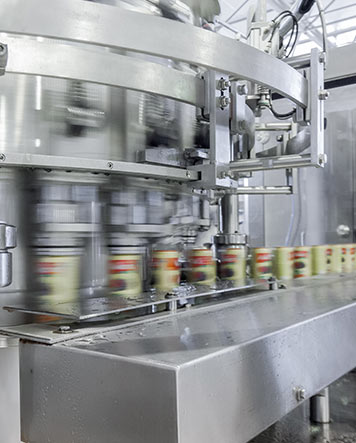PLCs and DCSs in Food and Beverage Manufacturing: From Farm to Table with Automation
Introduction
The food and beverage industry is a vast and diverse sector, encompassing everything from raw ingredient processing to packaging and distribution of finished products. This industry faces unique challenges, including stringent hygiene regulations, complex batch processes, high-speed production lines, and the need for consistent product quality and traceability. Programmable Logic Controllers (PLCs) and Distributed Control Systems (DCSs) are essential automation technologies that play a critical role in addressing these challenges and optimizing operations throughout the food and beverage production chain.
PLC Applications in Food and Beverage Manufacturing
PLCs are widely used for discrete control, managing individual machines, and handling batch processes in food and beverage plants:
- Batching and Mixing: PLCs control the precise weighing and mixing of ingredients according to recipes. This includes:
- Ingredient Dispensing: Controlling valves, pumps, and feeders to add the correct amounts of ingredients.
- Mixer Control: Controlling the speed, time, and operation of mixers.
- Recipe Management: Storing and managing multiple recipes.
- CIP (Clean-in-Place) Control: Automating the cleaning and sanitization of batching and mixing equipment.
- Packaging and Labeling: PLCs control high-speed packaging lines, including:
- Filling Machines: Controlling the filling of bottles, cans, cartons, and other containers.
- Capping and Sealing Machines: Controlling the application of caps, lids, and seals.
- Labeling Machines: Controlling the application of labels.
- Case Packers: Controlling the packing of products into cases.
- Palletizers: Controlling the stacking of cases onto pallets.
- Conveyor Systems: PLCs control conveyor systems that transport products throughout the plant.
- Oven and Cooking Control: PLCs manage the temperature, time, and other parameters of ovens, cookers, and other thermal processing equipment.
- Refrigeration and Cooling: PLCs control refrigeration systems, freezers, and cooling tunnels.
- CIP (Clean-in-Place) Systems: PLCs are central to automating CIP systems, which clean and sanitize equipment without disassembly.
- Machine Safety: PLCs are used in safety systems to protect workers from hazards associated with machinery.
DCS Applications in Food and Beverage Manufacturing
DCSs are employed for continuous process control, plant-wide integration, and overall system management in food and beverage plants:
- Pasteurization: DCSs control pasteurization processes, which heat liquids to kill harmful microorganisms. This involves:
- Temperature Control: Precise control of temperature to ensure effective pasteurization without damaging the product.
- Flow Control: Controlling the flow rate of the liquid through the pasteurizer.
- Holding Time Control: Ensuring that the liquid is held at the correct temperature for the required time.
- Sterilization: DCSs control sterilization processes, which use higher temperatures than pasteurization to achieve a longer shelf life.
- Fermentation: DCSs control fermentation processes, which are used in the production of beer, wine, yogurt, and other products. This involves:
- Temperature Control: Maintaining the optimal temperature for the growth of microorganisms.
- pH Control: Monitoring and controlling the pH of the fermentation mixture.
- Agitation Control: Controlling the mixing of the fermentation mixture.
- Evaporation and Concentration: DCSs control evaporators, which are used to concentrate liquids by removing water.
- Plant-Wide Utilities: DCSs manage plant-wide utilities, such as steam, compressed air, water, and wastewater treatment.
- Energy Management: DCSs help to optimize energy consumption throughout the plant.
- Quality Control and Traceability: DCSs collect and record data on process parameters, product quality, and ingredient usage, providing traceability throughout the production process. This is crucial for regulatory compliance and recall management.
- Alarm Management: DCSs provide sophisticated alarm management capabilities to alert operators to abnormal conditions and potential problems.
Hybrid Systems and Integration (PLCs and DCSs)
The food and beverage industry frequently utilizes hybrid systems, combining the strengths of PLCs and DCSs:
- PLC for Local Control: PLCs handle the fast, discrete control of individual machines and batch processes.
- DCS for Overall Coordination: The DCS oversees the entire production process, manages plant-wide utilities, and provides a unified platform for monitoring and control.
- Data Exchange and Communication: PLCs and DCSs communicate with each other, exchanging data and coordinating operations.
- MES/ERP Integration: Both PLCs and DCSs can be integrated with Manufacturing Execution Systems (MES) and Enterprise Resource Planning (ERP) systems. This provides real-time data for production planning, scheduling, inventory management, quality control, and regulatory compliance (e.g., HACCP – Hazard Analysis and Critical Control Points).
Benefits of PLCs and DCSs in Food and Beverage Manufacturing
- Improved Product Quality and Consistency: Precise control ensures consistent product quality and reduces batch-to-batch variability.
- Increased Production Efficiency: Automation reduces cycle times, increases throughput, and minimizes downtime.
- Enhanced Food Safety: Automated systems reduce the risk of contamination and improve hygiene. CIP systems are particularly important.
- Reduced Waste: Precise control of ingredients and processes minimizes waste.
- Regulatory Compliance: DCSs facilitate compliance with stringent food safety regulations (e.g., FDA, HACCP).
- Traceability: DCSs provide complete traceability of ingredients and products, which is essential for recalls and quality control.
- Data-Driven Decision Making: Real-time data from PLCs and DCSs provides valuable insights for process optimization, predictive maintenance, and continuous improvement.
- Flexibility and Scalability: PLC and DCS systems can be easily adapted to accommodate new products, recipes, and production requirements.
Conclusion
PLCs and DCSs are essential technologies for the modern food and beverage industry. They provide the automation, control, and integration capabilities needed to meet the demanding requirements of this sector, including hygiene, safety, quality, efficiency, and traceability. The trend towards hybrid systems, advanced process control, and greater integration with MES/ERP will continue to drive innovation and optimization in food and beverage manufacturing, ensuring the safe and efficient production of high-quality products for consumers worldwide.
 中文版
中文版






